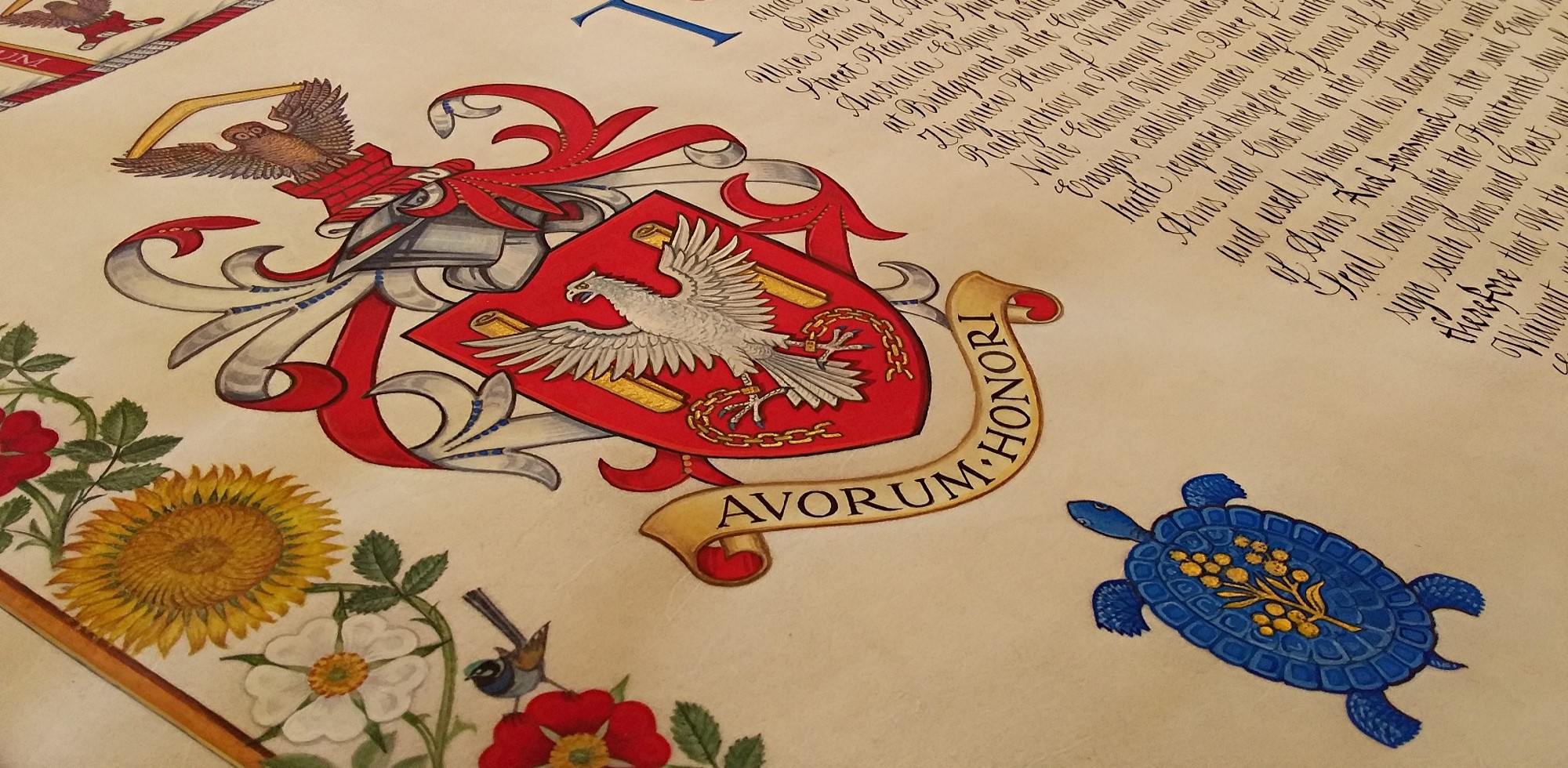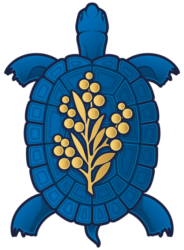PAL-LA-SHAY you might be encouraged to say of our Queensland Premier’s surname, but nothing could be more erroneous; culturally, historically and linguistically insulting to those of fair dinkum Polish ancestry.
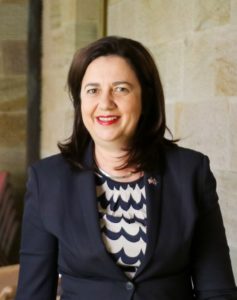
As a genealogist, etymologist and nomenclaturist (retired) I am occasionally asked by persons of Polish and eastern European descent to assist them with their family history research when the going gets tough.
When locating ancestors overseas appears an impossible task, and access to vital records seems an elusive dream, researchers often forget to utilise the simplest facts right in front them to elicit new avenues of enquiry to discern the origins of their family – names; personal and place!
It is interesting just how much information you can glean from an individual’s Christian name, surname, and the names of the places they originate from.
In the case of our esteemed Premier Annastacia Palaszczuk, it is written in her Wikipedia biography that she is “the daughter of veteran state Labor MP Henry Palaszczuk, who was born in Germany to Polish parents.”
According to the Palaszczuk family immigration records publicly available at the National Archives of Australia, Annastacia’s grandfather Hipolit/Hipolite was born in Wolka/Wulce and her grandmother Ludviga/Ludwiga born in Racje/Rajca/Rajzca, Poland.
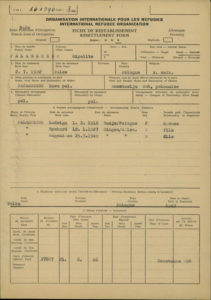
Now the surname Palaszczuk is both a toponym (i.e. a place name derived from a topographical feature) and a blended patronymic derived from the word PALASZ (say, pow-w-ash), which in the Polish language means ‘broadsword’ – basically a nickname for a combative or fierce individual, a soldier – and the suffix CZUK (say, chook).
In Ukrainian and Russian Cyrillic script the surname Palaszczuk is rendered Палащук.
The suffix CZUK is particular to surnames found and originating in western Ukraine, an area that was once occupied by Poland.
CZUK (sometimes spelt CIUK – and yes pronounced chook) when written singularly, means a ‘mouth’ or ‘snout’ in Ukrainian.
When used as a surname suffix, CZUK, sometimes transcribed CHUK, designates one as being the son of.
Palaszczuk, basically, one who is the son of a soldier, or one who points out errors in others – someone who is censorious or pedantic?
As for the correct rendering of the name, the ‘L’ in the surname Palaszczuk originally had a diacritical (or accent/pronunciation) mark through it (Ł); this being best described as a forward slash ‘/’ through the ‘L’.
So the correct pronunciation of the Pałaszczuk surname is Pow-w-ash-chook NOT Pal-la-shay!
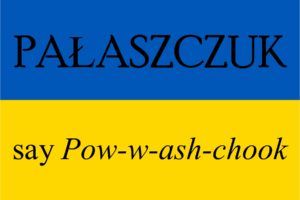
Annastacia is more rendiscent and common of an eastern Slavic (Ukrainian) Christian name than Polish.
The Polish rendering of Anastasia is Anastazja – not Annastacia; just as the correct form of Ludovica is Ludwika – not the eastern Slavic Ludviga or Ludwiga!
The place name Wolka (usually spelt with a diacritical mark, or an apostrophe, over the o) is indicative of a hamlet, or a new settlement and is in most cases conjunctive with another appellation to form a place name, e.g. Wólka Lubieszowska.
Wulce on the other hand, more correctly spelt WOLCZE (the ‘L’ having a diacritical forward slash ‘/’ through it) is now known as Vovche (sometimes Volche, or Volchýe – 49°21’ N x 22°91’ E) and located in the Ukraine about Turka (49°15’ N x 23°03’ E).
Now given that the surname Pałaszczuk is most certainly eastern Slavic, or Ukrainian in its origin, it is more than likely the family originates from that area about Palashevka/Palashivka in the Ternopil Oblast in western Ukraine (48°98’ N x 25°57’ E).
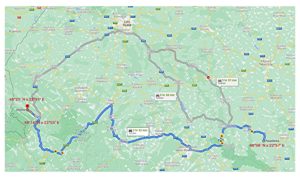
Palashivka is only 195.57 kilometres directly due east of Volche it is a 5 hour 27 minute, or 325 km road trip.
Pałaszczuk is a surname commensurate with that of an ethnic Ukrainian, and for all intents and purposes the family originates from the Ukraine; it is not of Polish origin!
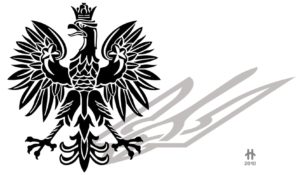
So why does our Premier insist on the pronunciation Pal-la-shay?
Well, Pal-la-shay does have a distinctively nice sound when enunciated, a bit like the French palais – a palace, especially a French government or municipal building.
Or could the pronunciation be more a case of family lore, or even an attempt by the Pałaszczuk family to hide their true ethnic roots by passing themselves off as Poles.
Passing-off one’s self as being of Polish ancestry was typical of an earlier era of immigration in the twentieth century when linguistic hostility prevailed against eastern Slavic (Ukrainian) families who tried to mask the stigma of their true ethnic identity and origins in order to cross international borders, emigrate, and assimilate into unwary foreign populations unacquainted with their history and inherent animosity towards Poles.
Of course, not saying that our Queensland Premier’s family was involved in anything untoward or mischievous.
Eastern Europe was in turmoil, a bloodbath during the first decades of the twentieth century and the animosity between Poles and Ukrainians was particularly vehement as a result of a series of bloody conflicts and ethnic cleansing perpetrated mainly against Poles by Ukrainians over lands won by Poland during the 1919-1921 Polish-Soviet War.
The Polish-Soviet War saw the birth of the Second Republic of Poland (Polish, Rzeczpospolita Polska) and the reclamation of her lands lost through years of partition, cultural, political and economic suppression.
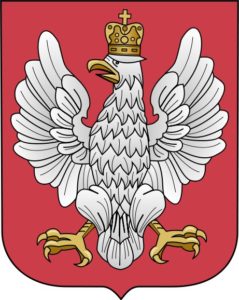
Poland had not existed as an independent sovereign state since the Third Partition of her lands by Prussia, the Austrian, and the Russian Empires in 1795.
To reduce the probability of further military and political aggression and incursion into her newly acquired lands, the Polish State settled ethnic Poles (mainly those with a military background) along her eastern borderland corridor (the Kresy); this resulted in a growing and well-entrenched animosity between Poles and Ukrainians which continues to this day.
And contrary to some claims, rumours and wishful thinking, the name Pałaszczuk does not appear in any of the registers of the Polish nobility and our Queensland Premier is certainly not a Princess.
About me? With William F. Hoffman I co-authored First Names of the Polish Commonwealth: Origins & Meanings. Polish Genealogical Society of America: Chicago, USA; 1998.
In September 2018 I was asked by Warner Bros. International Television Production Australia to consult on the WDYTYA? Australian Television Series episode of Dr Karl Kruszelnicki which SBS Australia aired at 7.30pm on Tuesday 21 May 2019.
The lead researcher and field producer remarked: “it really helps with making sure we tell the right facts on our programme. You clearly know your stuff so it is great for us to have found you. Your help has been invaluable on this and I am very grateful.”
As well as holding an M.A. in Foreign Languages, William F. Hoffman is a former member of the Board of Directors of the Polish Genealogical Society of America (PSGA), a prolific writer, translator and professional linguist.
Revisions:
Article originally published The Chronicle: Toowoomba; 8 May 2018. Revised: 30 November 2023; 16 January 2023; 31 December 2021; 6 December 2021; 2 December 2021; 31 October 2021.
